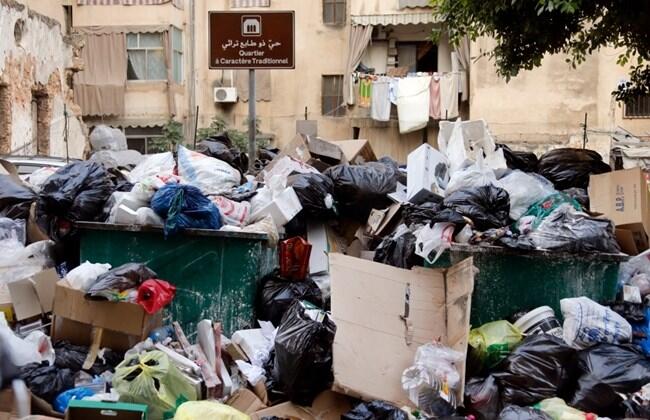Sukleen workers removed some of the trash to temporary locations as they waited for the government to identify new permanent landfills. A ministerial committee tasked with managing solid waste convened for a second day under Prime Minister Tammam Salam at the Grand Serail, but failed to secure locations to dump the trash. It will meet again Wednesday. The committee, comprised of ministers from various political parties, reached an agreement Monday according to which the mountains of garbage would be immediately removed from Beirut and Mount Lebanon by Sukleen, the company in charge of collecting trash in the area. The garbage was to be equally distributed to newly established dumps across Lebanon. But efforts to secure the new dumping sites have reached a dead end. Nabil Jisr, head of the Council of Development and Reconstruction, attended the ministerial meeting, and said authorities were contacting local officials across the country to secure sites for new landfills. “The committee is considering several possibilities regarding where to establish the new landfills,” he told The Daily Star. “We were expecting that this issue would be resolved today but this did not happen.” He said that in the meantime trash is being removed and stored in temporary locations, “and some is still inside trucks.” Pascale Nassar, Sukleen’s communications director, said the company was collecting garbage in areas where local officials had secured temporary repositories for the trash. Asked why the garbage had not been removed from all Beirut districts, Nassar said: “The amount of trash is very large. Maybe they [Sukleen workers] are not removing garbage from all [Beirut] areas at the same time – this will happen gradually but [as quickly as we can do it].” Nassar said that Sukleen would not be able to restore the level of cleanliness it maintained when operating under normal conditions. “We are [conducting a] crisis operation right now.” The trash crisis began 10 days ago when the Environment Ministryshut down the Naameh landfill, south of Beirut, without securing a substitute. Quarries in the Aley village of Ain Dara are among the areas the government is reportedly considering for the establishment of new landfills. But this news prompted dozens of residents to briefly block the Dahr al-Baidar road linking the capital to east Lebanon. They then blocked the road to the quarries as well, saying they would only reopen them after receiving assurances from the government that no landfills would be built. Sidon Mayor Mohammad Saudi also reiterated his rejection of a request by the Environment Ministry to have 150 to 200 tons of garbage treated at the city’s waste treatment facility. “This is technically impossible. The municipality [represents] the opinion of all city factions and we will not make such a decision without consensus,” he said. For his part, Education Minister Elias Bou Saab, of the Free Patriotic Movement, said after the meeting that there were no suitable landfill locations in either Metn or Kesrouan. Foreign Minister Gebran Bassil said the FPM would not impose the establishment of new dumps on people. “It is the government’s responsibility to cooperate with municipalities and find proper landfills.” Interior Minister Nouhad Machnouk rejected a preliminary decision by the Financial Prosecutor Judge Ali Ibrahim to form a technical committee to investigate the waste treatment companies Sukleen and Sukomi. Sukleen and Sukomi are both part of the Averda group, owned by investor Maysara Sukkar. “What does his decision mean?” asked Machnouk. “If he based his decision on a political position, then the judiciary is politicized.” Kataeb Party chief Sami Gemayel Monday urged the judiciary to open Sukleen’s books, accusing the firm of theft and monopolistic practices. Former Prime Minister Saad Hariri’s Future bloc released a statement voicing hope that the government could resolve the problem “on the basis of partnership and integration between all Lebanese people and areas.” “The bloc hopes that decisions by the ministerial committee … will provide the required solutions, in accordance with the Cabinet decisions of 2010,” read the statement, referring to a plan by Hariri’s government to build incinerators. The Future bloc also condemned an attack on the car of Social Affairs Minister Rashid Derbas in Beirut’s Spears neighborhood by residents protesting the trash crisis. “They hit my car and damaged it,” Derbas told The Daily Star over the phone. “They threw garbage at my car, and they cursed me.” Derbas said he recognized one of the men and would file charges against him. Tarek Mallah was later arrested by the Internal Security Forces Information Branch at the request of State Prosecutor Samir Hammoud. Derbas said his car remained trapped by protesters for 15 minutes before he could drive off. Shortly before the incident, the protesters in question had been part of a demonstration outside the Grand Serail calling for a sustainable, long-term solution to the crisis. Hundreds of people attended. A handful of protesters threw eggs and water bottles toward the Grand Serail, while others tipped over dumpsters as the police stood by. The crowds blocked roads into Downtown Beirut, causing traffic jams. The protest was organized by the newly established group “You Reek” to express their opposition to the agreement reached by the ministerial committee on Monday. A video taken by members of “You Reek” and posted on Facebook showed trucks dumping garbage in an open space. The Daily Star











